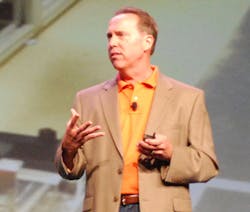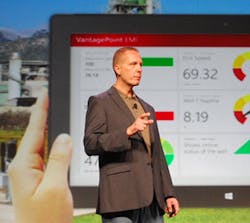This article was originally published on ControlGlobal.com.
Making confident decisions from good data was difficult to do.—Rockwell Automation's Bob Murphy on the company's need for improved supply chain visibility.
With all the performance-boosting technology solutions that Rockwell Automation brings to bear on behalf of its industrial customers, it's sometimes easy to forget that Rockwell Automation is a global manufacturer in its own right. As such, it shares many of the same challenges that its customers around the world face—and benefits from those same technology solutions.
At the welcome keynote address at this week's RSTechED conference in Orlando, Florida, Rockwell Automation executives shared with nearly 2,000 conference attendees from 39 countries the company's ongoing journey to realize its vision of a "Connected Enterprise," in which increasingly intelligent devices and assets, together with secure and ubiquitous network connectivity, enable individuals to make better decisions more quickly than ever before.
387,000 SKUs
Over the 35 years that Bob Murphy, vice president, operations, has worked for Rockwell Automation, the company's product catalog has grown to 387,000 stock-keeping units (SKUs) ranging from $100 configurable stacks of tower lights delivered in two or three days to $500,000 medium-voltage drives with a lead time of several months. "Average life of our products is 20 years, and the average order is 200 line items," Murphy said, explaining how several years ago the company found that growth had simply outrun its systems' ability to keep up, necessitating a thorough restructuring of the company's supply chain.
"Making confident decisions from good data was difficult to do," Murphy confessed. "We had as many as five different ERP systems in some of our plants, countless software applications, and that middle layer of manufacturing execution was missing."
To improve visibility across its global operations, the company embarked on a corporate-wide SAP implementation at the enterprise level, together with an extensive standardization of manufacturing execution system (MES) workflow processes based on the company's own FactoryTalk ProductionCentre platform. Meanwhile, the company committed to maintaining or improving the service level its customers had come to expect, Murphy explained. "At times it felt like changing a tire at 60 mph," he said.
People, Processes, Technology
The effort directly involved some 45 engineers and project managers from across the company, and the changes implemented involved many more people, processes and technologies. On the personnel side, the company formed a new APOS group, for advanced process operations support, that now includes subject matter experts in various disciplines from across the company. A small but dedicated group of MES specialists was also created. They standardized workflow processes on core designs, which required that they overcome local loyalties to legacy applications and build new respect for a global standard, Murphy explained. "We deployed a centrally managed toolkit with configuration tied to plant metrics."
Since embarking on its own journey, Rockwell Automation already has realized 4 to 5% annual productivity gains, but hasn't rested on its laurels. "As we've improved, we've set new sights," Murphy said. "And FactoryTalk ProductionCentre is at the heart of what we do."
If you use Logix, you're already on that journey too.—Rockwell Automation's Frank Kulaszewicz on the company's continued investment in making its Logix both smarter and more capable.
Sharing the Journey
Just as Rockwell Automation continues to reap benefits through the disciplined application of digital technology, it can also help its customers along on the road to becoming "Connected Enterprises" themselves, said Frank Kulaszewicz, Rockwell Automation senior vice president, architecture and software.
"The rise of the machines" is upon us, Kulaszewic said, with a wink and a nod to the Terminator series of apocalyptic films. "But in a good way," he added. "All devices will be smarter, and if we connect them, we can derive value. The automation industry is at an inflection point," he added. "Like the music industry a few years ago, the automation industry is changing."
Further, Rockwell Automation is uniquely positioned to help its clients realize their share of the $14-trillion value at stake in this new age of connectivity and computing power—the largest portion of which is in manufacturing, according to Cisco. "We continue to build on the Logix platform, which will continue to grow smarter and more capable," Kulaszewic said.
Indeed, Rockwell Automation's strategic decision several years ago to settle on a common industrial network based on unmodified Ethernet continues to pay dividends, Kulaszewicz said. "Security is the table stakes today, and a common industrial network provides a unified path to a secure environment," he said. "Meanwhile, we acknowledge that our customers are in many different places along the way, and we pledge to bring you along. If you use Logix, you're already on that journey too."
To learn more about implementing a more intelligent OT/IT network, and best practices to help ensure effective change in both technologies and organizational cultures, download this whitepaper.


